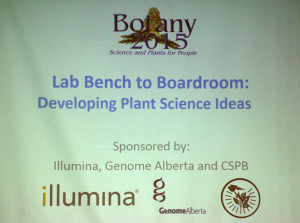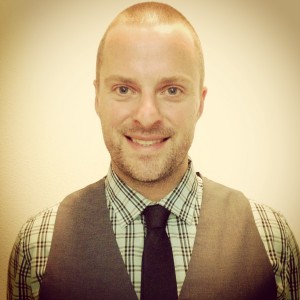This blog post was written by Amanda Gregoris and R. Glen Uhrig who organized a workshop entitled “Lab Bench to Boardroom” at the Botany 2015 meeting in Edmonton, Alberta, Canada.
Our motivation behind holding this workshop was to engage graduate students and post-doctoral fellows to consider the science behind biotechnology. We designed this workshop to be an opportunity to expose students and post-doctoral fellows to how industry experts and entrepreneurs develop ideas, and how they refine those ideas to make them attractive business opportunities for investors. We created an environment where students and post-doctoral fellows could ‘pitch’ their own plant science business ideas to a panel of industry experts. Through cooperative idea development with the panel and audience members, presenters were able to learn how to evolve their ideas, as well as how their peers viewed their proposed ideas.
Workshops such as Lab Bench to Boardroom are of central importance given the limited availability of academic positions. In light of this fact, students and post-doctoral fellows alike need to consider career options outside of academia prior to completion of their degrees, contracts or fellowships. It is imperative that early career researchers invest time to maximize long-term career outcomes. Workshops like ours and others assist in this by developing a thorough understanding of the non-academic opportunities available.
If you are an early career researcher looking to move away from academia, some industry positions for graduates and post-doctoral fellows may include:
- research and development,
- quality control,
- marketing,
- market research analyst,
- business development manager,
- competitive intelligence analyst,
- product manager, and
- management consulting.
Notice that these opportunities are not only based at the lab bench, but can be in more managerial or consulting positions. Your experiences as a researcher have given you highly valued skills, so don’t limit your options! Of course, industry is not the only option, and other opportunities may include working in a government lab, public policy, science writing, herbarium curation or patent agent.
The question of whether enough is being done to inform graduate students and post-doctoral fellows of alternative, non-academic career paths is one often asked, and is one that varies by institution. In our experience, universities have taken a largely standard approach, offering lectures by professionals from industry, as well as informal social gatherings aimed at connecting students to industry. Although these are good opportunities, they represent just the tip of the iceberg in terms of what could be done to inspire entrepreneurship amongst the upcoming generation of plant scientists, and better assist them with the transition from an academic focus to an industry focus.
Workshop concepts similar to Lab Bench to Boardroom could be developed at the departmental level, or by university career centers, to allow graduate students and post-doctoral fellows to gain an elevated understanding of non-academic career opportunities. Some universities have made great strides in this area, creating internship resources for current graduate students in the areas of biotechnology and public policy. Along these lines, university career centers will usually have databases of current job postings that can assist students in the search for life after grad school.
In the end, it is imperative that universities, governments and industry continue to work to develop strategies that assist graduate students and post-doctoral fellows in the transition from academics to successful non-academic careers. This can be accomplished either individually, or through partnerships between these groups. We believe that developing these strategies is undoubtedly essential to the sustainable development of new ideas and technologies in the plant sciences that will be required to address the current and future needs of society.
Amanda Gregoris is a Ph.D. candidate in the Department of Biological Sciences at the University of Alberta, Canada and Dr. R. Glen Uhrig is a post-doctoral fellow at the ETH Zurich, Switzerland. Both are members of the Canadian Society of Plant Biologists.










